NT
-
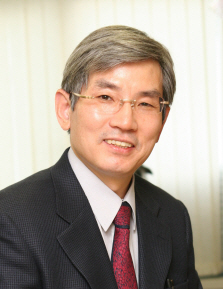 Professor Huen Lee to Receive Lifetime Achievement Award from the International Conference on Gas Hydrates
Professor Huen Lee of the Chemical and
Biomolecular Engineering Department at KAIST will receive a lifetime
achievement award at the 8th International Conference on Gas
Hydrates (ICGH) to be held from July 28, 2014 to August 2, 2014 in Beijing,
China.
Among his other scholarly and research accomplishments, Professor Lee achieved the development of natural gas by injecting
carbon dioxide and nitrogen into the layers of gas hydrates. With this
technology, ConocoPhilips, an American multinational energy corporation,
successfully extracted natural gas from the gas hydrates in the North Slope of
Alaska in the US in April 2012.
Meeting every three years in a different
country around the world, ICGH is a leading gathering of scientists and
engineers in gas hydrates. The 8th conference will be held under the
theme of “Opportunity and Challenge-Development and Utilization of Gas
Hydrates.”
2014.03.25 View 7959
Professor Huen Lee to Receive Lifetime Achievement Award from the International Conference on Gas Hydrates
Professor Huen Lee of the Chemical and
Biomolecular Engineering Department at KAIST will receive a lifetime
achievement award at the 8th International Conference on Gas
Hydrates (ICGH) to be held from July 28, 2014 to August 2, 2014 in Beijing,
China.
Among his other scholarly and research accomplishments, Professor Lee achieved the development of natural gas by injecting
carbon dioxide and nitrogen into the layers of gas hydrates. With this
technology, ConocoPhilips, an American multinational energy corporation,
successfully extracted natural gas from the gas hydrates in the North Slope of
Alaska in the US in April 2012.
Meeting every three years in a different
country around the world, ICGH is a leading gathering of scientists and
engineers in gas hydrates. The 8th conference will be held under the
theme of “Opportunity and Challenge-Development and Utilization of Gas
Hydrates.”
2014.03.25 View 7959 -
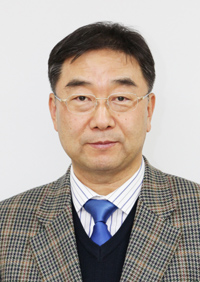 Professor Kyung-Wook Paik Receives the Best Presentation Award from 2014 Pan Pacific Symposium
The Surface Mount Technology Association (SMTA) hosted its 19th Annual Pan Pacific Microelectronics Symposium on February 11-13, 2014 in Hawaii.
The 2014 conference, promoting international technical exchange and extensive networking among microelectronics professionals from around the world, presented over 50 papers from 17 countries.
Professor Kyung-Wook Paik of Materials Science Engineering at KAIST received the Best Presentation Award for his paper titled, “Novel Nanofiber Anisotropic Films for Nine Pitch Assembly” at the conference.
SMTA is an international network of professionals in electronics assembly technologies, including Microsystems, emerging technologies, and related business operations.
2014.03.17 View 9654
Professor Kyung-Wook Paik Receives the Best Presentation Award from 2014 Pan Pacific Symposium
The Surface Mount Technology Association (SMTA) hosted its 19th Annual Pan Pacific Microelectronics Symposium on February 11-13, 2014 in Hawaii.
The 2014 conference, promoting international technical exchange and extensive networking among microelectronics professionals from around the world, presented over 50 papers from 17 countries.
Professor Kyung-Wook Paik of Materials Science Engineering at KAIST received the Best Presentation Award for his paper titled, “Novel Nanofiber Anisotropic Films for Nine Pitch Assembly” at the conference.
SMTA is an international network of professionals in electronics assembly technologies, including Microsystems, emerging technologies, and related business operations.
2014.03.17 View 9654 -
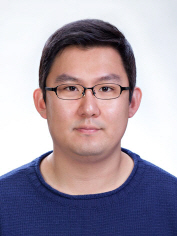 Tae-Wan Kim, a doctoral candidate, receives the best paper award from ECTC
The 2014 Electronic Components and Technology Conference (ECTC) will take place on May 27-30 in Florida, USA. Tae-Wan Kim, a Ph.D. candidate at the Department of Materials Science Engineering (MSE), KAIST, will receive the Intel Best Student Paper Award at the conference.ECTC is the premier international conference that brings together the best researchers and engineers in packaging, components and microelectronic systems science, technology and education in an environment of cooperation and technical exchange. The conference is sponsored by the Components, Packaging and Manufacturing Technology (CPMT) Society of IEEE (Institute of Electrical and Electronics Engineering).The paper describes research on novel nanofiber anisotropic conductive films for ultra fine pitch electronic package application, which was written under the guidance of Professor Kyung-Wook Paik of the MSE Department. In the past ten years, two of his students have received the best paper award from ECTC.
2014.03.14 View 11762
Tae-Wan Kim, a doctoral candidate, receives the best paper award from ECTC
The 2014 Electronic Components and Technology Conference (ECTC) will take place on May 27-30 in Florida, USA. Tae-Wan Kim, a Ph.D. candidate at the Department of Materials Science Engineering (MSE), KAIST, will receive the Intel Best Student Paper Award at the conference.ECTC is the premier international conference that brings together the best researchers and engineers in packaging, components and microelectronic systems science, technology and education in an environment of cooperation and technical exchange. The conference is sponsored by the Components, Packaging and Manufacturing Technology (CPMT) Society of IEEE (Institute of Electrical and Electronics Engineering).The paper describes research on novel nanofiber anisotropic conductive films for ultra fine pitch electronic package application, which was written under the guidance of Professor Kyung-Wook Paik of the MSE Department. In the past ten years, two of his students have received the best paper award from ECTC.
2014.03.14 View 11762 -
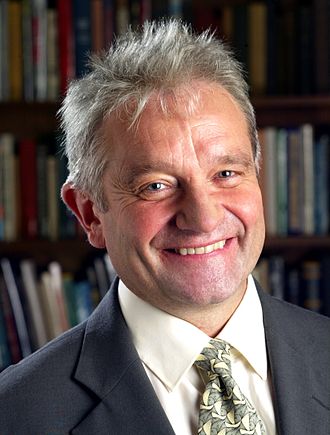 Visit by Sir Paul Maxime Nurse, President of the Royal Society
Sir Paul Maxime
Nurse, who is an English geneticist and cell biologist, visited KAIST and gave
a lecture entitled The Great Ideas of
Biology on March 11, 2014.
Sir Paul was awarded the 2001 Nobel Prize in
Physiology or Medicine with Leland H. Hartwell and R. Timothy Hunt for their discoveries
of protein molecules that control the division of cells in the cell cycle.
He was Professor of Microbiology at the University
of Oxford, CEO of the Imperial Cancer Research Fund and Cancer Research UK, and
President of Rockefeller University in New York. Sir Paul is currently the President of
the Royal Society as well as Director and Chief Executive of the Francis Crick
Institute.
Founded in London in 1660, the Royal Society is composed of the world’s most distinguished scientists drawn from all areas of
science, engineering, and medicine.
Below is a summary of his lecture, The Great Ideas of Biology:
Four major ideas of biology
are the theory of genes, evolution by natural selection, the proposal that the
cell is the fundamental unit of all life, and the chemical composition of a cell.
When considering the
question “what is life?” these ideas come together. The special way cells reproduce
provides the conditions by which natural selection takes place, allowing living
organisms to evolve. The organization of chemistry within the cell provides
explanations for life’s phenomena.
In addition, an emerging idea
is the nature of biological self-organization with which living cells and organisms
process information and acquire specific forms. These great ideas have
influenced one another and changed the way we perceive biology and science
today.
2014.03.11 View 10748
Visit by Sir Paul Maxime Nurse, President of the Royal Society
Sir Paul Maxime
Nurse, who is an English geneticist and cell biologist, visited KAIST and gave
a lecture entitled The Great Ideas of
Biology on March 11, 2014.
Sir Paul was awarded the 2001 Nobel Prize in
Physiology or Medicine with Leland H. Hartwell and R. Timothy Hunt for their discoveries
of protein molecules that control the division of cells in the cell cycle.
He was Professor of Microbiology at the University
of Oxford, CEO of the Imperial Cancer Research Fund and Cancer Research UK, and
President of Rockefeller University in New York. Sir Paul is currently the President of
the Royal Society as well as Director and Chief Executive of the Francis Crick
Institute.
Founded in London in 1660, the Royal Society is composed of the world’s most distinguished scientists drawn from all areas of
science, engineering, and medicine.
Below is a summary of his lecture, The Great Ideas of Biology:
Four major ideas of biology
are the theory of genes, evolution by natural selection, the proposal that the
cell is the fundamental unit of all life, and the chemical composition of a cell.
When considering the
question “what is life?” these ideas come together. The special way cells reproduce
provides the conditions by which natural selection takes place, allowing living
organisms to evolve. The organization of chemistry within the cell provides
explanations for life’s phenomena.
In addition, an emerging idea
is the nature of biological self-organization with which living cells and organisms
process information and acquire specific forms. These great ideas have
influenced one another and changed the way we perceive biology and science
today.
2014.03.11 View 10748 -
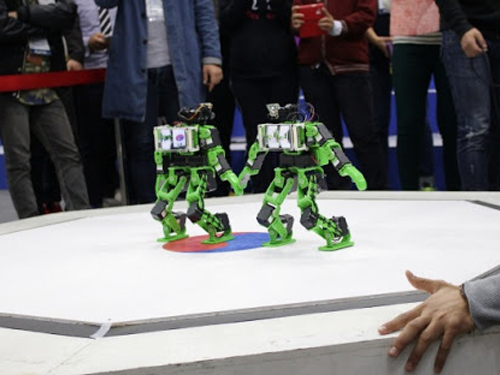 KAIST Holds the 2014 System on Chip (SoC) Robot War in August and October
Domestic and international competitions for robots with artificial intelligence are organized by Professor Hoi-Jun Yoo of Electrical Engineering.
KAIST will host two robot competitions this year: The Robot Integration Festival will be held in August at the Convention Center in Daejeon and the International Robot Contest in October at the Kintex in Ilsan. Participating robots are developed based on the System on Chip (SoC).
SoC robots refer to an autonomous robot that has a processor, a memory, peripheral devices, logic, and other system components combined on a single chip, which enables the robots to handle tasks and make decisions without human intervention.
The competitions include three entries: Taekwon Robot, HURO-competition, and SoC Drone which was added for the first time this year.
The Taekwon Robot involves a one-on-one sparring match, using a Korean traditional martial art, between two robots. Competitors score points based on front and side kicks, as well as punching. The HURO-competition pits robots in a competition to perform assignments such as hurdling, barricade clearing, crossing bridges, and overcoming other obstacles. The SoC Drone evaluates robots' capability to track miniature cars and navigate between buildings while in flight. The drone should have two cameras and a SoC brainboard equipped to offer autonomous, remote-controlled flight.
The director of the competitions, Professor Hoi-Jun Yoo of Electrical Engineering at KAIST, commented that with the integration of Korea’s world-class semiconductor technology, the competitions would lead to improvements in robotics engineering and unmanned aerial vehicle technology.
The competitions are open to anyone interested in SoC robots and unmanned aerial vehicles. For more information about the competitions, please visit http://www.socrobotwar.org . The application deadline is April 15, 2014.
2014.03.11 View 10802
KAIST Holds the 2014 System on Chip (SoC) Robot War in August and October
Domestic and international competitions for robots with artificial intelligence are organized by Professor Hoi-Jun Yoo of Electrical Engineering.
KAIST will host two robot competitions this year: The Robot Integration Festival will be held in August at the Convention Center in Daejeon and the International Robot Contest in October at the Kintex in Ilsan. Participating robots are developed based on the System on Chip (SoC).
SoC robots refer to an autonomous robot that has a processor, a memory, peripheral devices, logic, and other system components combined on a single chip, which enables the robots to handle tasks and make decisions without human intervention.
The competitions include three entries: Taekwon Robot, HURO-competition, and SoC Drone which was added for the first time this year.
The Taekwon Robot involves a one-on-one sparring match, using a Korean traditional martial art, between two robots. Competitors score points based on front and side kicks, as well as punching. The HURO-competition pits robots in a competition to perform assignments such as hurdling, barricade clearing, crossing bridges, and overcoming other obstacles. The SoC Drone evaluates robots' capability to track miniature cars and navigate between buildings while in flight. The drone should have two cameras and a SoC brainboard equipped to offer autonomous, remote-controlled flight.
The director of the competitions, Professor Hoi-Jun Yoo of Electrical Engineering at KAIST, commented that with the integration of Korea’s world-class semiconductor technology, the competitions would lead to improvements in robotics engineering and unmanned aerial vehicle technology.
The competitions are open to anyone interested in SoC robots and unmanned aerial vehicles. For more information about the competitions, please visit http://www.socrobotwar.org . The application deadline is April 15, 2014.
2014.03.11 View 10802 -
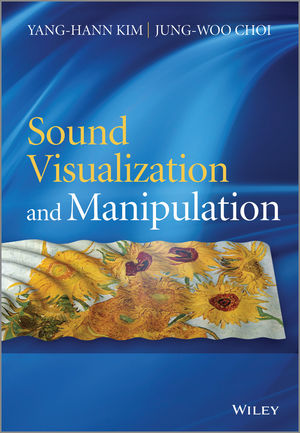 Book Announcement: Sound Visualization and Manipulation
The movie
Gravity
won seven Oscar awards this year, one of which was for its outstanding 3D sound mixing, immersing viewers in the full experience of the troubled space expedition.
3D audio effects are generated by manipulating the sound produced by speakers, speaker-arrays, or headphones to place a virtual sound source at a desired location in 3D space such as behind, above, or below the listener's head.
Two professors from the Department of Mechanical Engineering at KAIST have recently published a book that explains two important technologies related to 3D sound effects: sound visualization and manipulation.
Professor Yang-Hann Kim, an eminent scholar in sound engineering, and Professor Jung-Woo Choi collaborated to write Sound Visualization and Manipulation (Wily 2013), which uniquely addresses the two most important problems in the field in a unified way.
The book introduces general concepts and theories and describes a number of techniques in sound visualization and manipulation, offering an interrelated approach to two very different topics: sound field visualization techniques based on microphone arrays and controlled sound field generation techniques using loudspeaker arrays.
The authors also display a solid understanding of the associated physical and mathematical concepts applied to solve the visualization and manipulation problems and provide extensive examples demonstrating the benefits and drawbacks of various applications, including beamforming and acoustic holography technology.
The book will be an excellent reference for graduate students, researchers, and professionals in acoustic engineering, as well as in audio and noise control system development.
For detailed descriptions of the book:
http://as.wiley.com/WileyCDA/WileyTitle/productCd-1118368479.html
2014.03.10 View 13601
Book Announcement: Sound Visualization and Manipulation
The movie
Gravity
won seven Oscar awards this year, one of which was for its outstanding 3D sound mixing, immersing viewers in the full experience of the troubled space expedition.
3D audio effects are generated by manipulating the sound produced by speakers, speaker-arrays, or headphones to place a virtual sound source at a desired location in 3D space such as behind, above, or below the listener's head.
Two professors from the Department of Mechanical Engineering at KAIST have recently published a book that explains two important technologies related to 3D sound effects: sound visualization and manipulation.
Professor Yang-Hann Kim, an eminent scholar in sound engineering, and Professor Jung-Woo Choi collaborated to write Sound Visualization and Manipulation (Wily 2013), which uniquely addresses the two most important problems in the field in a unified way.
The book introduces general concepts and theories and describes a number of techniques in sound visualization and manipulation, offering an interrelated approach to two very different topics: sound field visualization techniques based on microphone arrays and controlled sound field generation techniques using loudspeaker arrays.
The authors also display a solid understanding of the associated physical and mathematical concepts applied to solve the visualization and manipulation problems and provide extensive examples demonstrating the benefits and drawbacks of various applications, including beamforming and acoustic holography technology.
The book will be an excellent reference for graduate students, researchers, and professionals in acoustic engineering, as well as in audio and noise control system development.
For detailed descriptions of the book:
http://as.wiley.com/WileyCDA/WileyTitle/productCd-1118368479.html
2014.03.10 View 13601 -
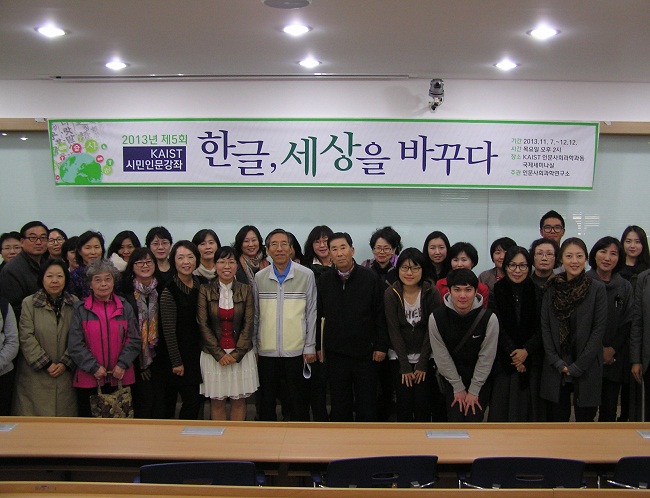 KAIST Holds Open Lecture For Daejeon Residents
Free of cost for any Korean citizen, the registration for the new course opens on the official website from 5th March KAIST’s Department of Humanities and Social Science is currently operating free humanities and liberal arts classes for Daejeon residents.
The theme of the course for this semester is “World and Politics,” which will begin on 13th March and run every Thursday for 6 weeks at KAIST’s International Seminar Room.
This course has been organized to introduce the general public to the current political situation with neighboring countries such as China, Japan and North Korea, as well as the characteristics of multinational companies.
Top experts in the related fields will give lectures. First, Professor Ha-Yong Jung from Kyunghee University will talk on “American liberalism and democracy”; Professor Gyeong-Mo An from Korea National Defense University on “Kim Jeong-Eun and the Future of North Korea--Is the Collapse of North Korea A Reality?” and Ja-Seon Koo, a visiting professor at Korea National Diplomatic Academy on “The Chinese Communist Party during the Xi Jinping Period.”
“With the era of globalization, the political situations in the neighboring countries have both direct and indirect effects on our lives,” said Professor Hyeon-Seok Park who has organized the courses. "These classes will be an opportunity for our citizens to understand and learn about the current affairs in the world.”
Anyone can attend the course, and registration is from March 5th to 9th at the official webpage of KAIST’s Humanities and Social Sciences Department (http://hss.kaist.ac.kr). All the courses are free of charge.
Contact: Department of Humanities and Social Science Research (Tel. 350-4687, E-mail: baobab@kaist.ac.kr)
2014.03.06 View 6949
KAIST Holds Open Lecture For Daejeon Residents
Free of cost for any Korean citizen, the registration for the new course opens on the official website from 5th March KAIST’s Department of Humanities and Social Science is currently operating free humanities and liberal arts classes for Daejeon residents.
The theme of the course for this semester is “World and Politics,” which will begin on 13th March and run every Thursday for 6 weeks at KAIST’s International Seminar Room.
This course has been organized to introduce the general public to the current political situation with neighboring countries such as China, Japan and North Korea, as well as the characteristics of multinational companies.
Top experts in the related fields will give lectures. First, Professor Ha-Yong Jung from Kyunghee University will talk on “American liberalism and democracy”; Professor Gyeong-Mo An from Korea National Defense University on “Kim Jeong-Eun and the Future of North Korea--Is the Collapse of North Korea A Reality?” and Ja-Seon Koo, a visiting professor at Korea National Diplomatic Academy on “The Chinese Communist Party during the Xi Jinping Period.”
“With the era of globalization, the political situations in the neighboring countries have both direct and indirect effects on our lives,” said Professor Hyeon-Seok Park who has organized the courses. "These classes will be an opportunity for our citizens to understand and learn about the current affairs in the world.”
Anyone can attend the course, and registration is from March 5th to 9th at the official webpage of KAIST’s Humanities and Social Sciences Department (http://hss.kaist.ac.kr). All the courses are free of charge.
Contact: Department of Humanities and Social Science Research (Tel. 350-4687, E-mail: baobab@kaist.ac.kr)
2014.03.06 View 6949 -
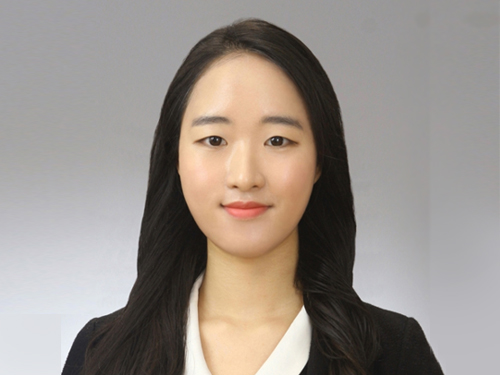 Seo-Eun Lee, an undergaruate student receives the Best Paper Award from Optical Society of Korea
Seo-Eun Lee, a student studying at KAIST’s Department of Biological Sciences, has won the Best Paper Award from Bio-Photonics Division at the 2014 Optical Society of Korea Winter Conference, held on 19th February at Daejeon Convention Center.
Only one outstanding paper per division is given an award among the total of 270 papers, and it is very unusual for an undergraduate student to win the award in the field that is not her major.
Lee has studied cell imaging using holography technology since June 2013 under the supervision of Professor Yong-Geun Park from the Department of Physics.
The Optical Society of Korea was founded in 1989, and as the largest academy in the field of optics in Korea, it holds academic presentations, seminars and lectures every year.
2014.03.06 View 10225
Seo-Eun Lee, an undergaruate student receives the Best Paper Award from Optical Society of Korea
Seo-Eun Lee, a student studying at KAIST’s Department of Biological Sciences, has won the Best Paper Award from Bio-Photonics Division at the 2014 Optical Society of Korea Winter Conference, held on 19th February at Daejeon Convention Center.
Only one outstanding paper per division is given an award among the total of 270 papers, and it is very unusual for an undergraduate student to win the award in the field that is not her major.
Lee has studied cell imaging using holography technology since June 2013 under the supervision of Professor Yong-Geun Park from the Department of Physics.
The Optical Society of Korea was founded in 1989, and as the largest academy in the field of optics in Korea, it holds academic presentations, seminars and lectures every year.
2014.03.06 View 10225 -
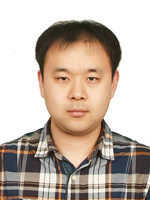 Seung-Han Lee, a doctoral student in electrical engineering, receives the best paper award from ISQED 2014
Seung-Han
Lee, a doctoral candidate in the department of electrical engineering at KAIST,
received a Best Paper Award from the International Symposium on Quality
Electronic Design (ISQED), a high-profile international conference started in 2000 to promote innovation and quality in electronic and
engineering designs through inter- and multidisciplinary approaches. The
award ceremony will take place at the 2014 ISQED on March 3-5, 2014 at the Convention
Center in Santa Clara, CA, USA.
Professor
Chong-Min Kyung, an advisor to Seung-Han, expressed his excitement about his student's achievement.
“This is
the first time a Korean has ever received the best paper award at this academic
conference. It’s great news to our student as well as to KAIST.”
The topic
of Lee’s research paper was dynamic cache data management for minimizing the
energy consumption of three-dimensional multi-processor semiconductor chips.
2014.03.03 View 10633
Seung-Han Lee, a doctoral student in electrical engineering, receives the best paper award from ISQED 2014
Seung-Han
Lee, a doctoral candidate in the department of electrical engineering at KAIST,
received a Best Paper Award from the International Symposium on Quality
Electronic Design (ISQED), a high-profile international conference started in 2000 to promote innovation and quality in electronic and
engineering designs through inter- and multidisciplinary approaches. The
award ceremony will take place at the 2014 ISQED on March 3-5, 2014 at the Convention
Center in Santa Clara, CA, USA.
Professor
Chong-Min Kyung, an advisor to Seung-Han, expressed his excitement about his student's achievement.
“This is
the first time a Korean has ever received the best paper award at this academic
conference. It’s great news to our student as well as to KAIST.”
The topic
of Lee’s research paper was dynamic cache data management for minimizing the
energy consumption of three-dimensional multi-processor semiconductor chips.
2014.03.03 View 10633 -
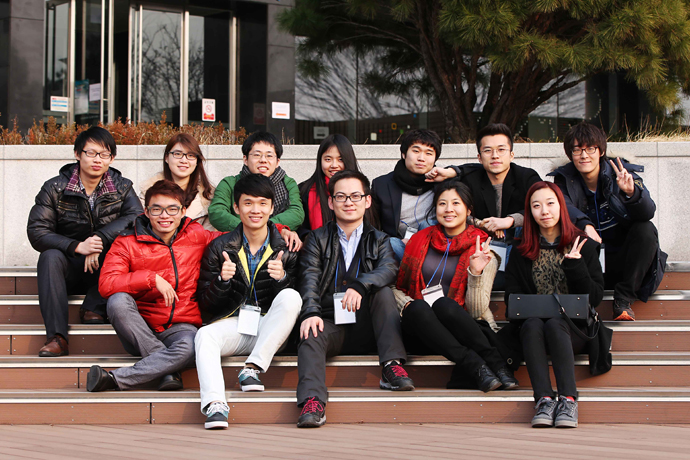 Festival Featuring Asia's Best Science Students to be Held
The first Electronic Olympics, which will host students from five top Asian research-centered universities, will be held in August at KAIST. Students will take part in competitive events and explore cultural diversity. Student representatives of HKUST, NTU, TITECH, Tsinghua University, and KAIST gathered on February 20 to begin planning the tentatively named “ASPIRE E-Olympics.”
The key words of this Olympics are "Harmony" and "Competition." The events will be composed of an AI programming contest, SEM (Scanning Electron Microscope) picture contest, and the other technology-based contests. Cultural events, where each university’s students can interact, will also be prepared.
ASPIRE (Asian Science and Technology Pioneering Institutes of Research and Education) events have been held from 2009. Previously, the ASPIRE forum has been an exchange event for groups of vice presidents and graduate school students from the five schools to exchange achievements in education and research. This year, it has been extended to undergraduates.
Yoseop Kim, KAIST’s student body vice president, said that he wants to make a MOU with some of Asia’s best research-centered universities and develop it into something similar to the Davos Forum. His intention is to support the E-Olympics in the hope that ASPIRE will become a top university consortium.
From left, HKUST, KAIST, NTU, TITECH, Tsinghua University Logos
Student representative group photo of Top Asian Research-Centered Universities
Electronic Olympics for students from five top Asian science and engineering universities to be held in August
2014.02.27 View 8714
Festival Featuring Asia's Best Science Students to be Held
The first Electronic Olympics, which will host students from five top Asian research-centered universities, will be held in August at KAIST. Students will take part in competitive events and explore cultural diversity. Student representatives of HKUST, NTU, TITECH, Tsinghua University, and KAIST gathered on February 20 to begin planning the tentatively named “ASPIRE E-Olympics.”
The key words of this Olympics are "Harmony" and "Competition." The events will be composed of an AI programming contest, SEM (Scanning Electron Microscope) picture contest, and the other technology-based contests. Cultural events, where each university’s students can interact, will also be prepared.
ASPIRE (Asian Science and Technology Pioneering Institutes of Research and Education) events have been held from 2009. Previously, the ASPIRE forum has been an exchange event for groups of vice presidents and graduate school students from the five schools to exchange achievements in education and research. This year, it has been extended to undergraduates.
Yoseop Kim, KAIST’s student body vice president, said that he wants to make a MOU with some of Asia’s best research-centered universities and develop it into something similar to the Davos Forum. His intention is to support the E-Olympics in the hope that ASPIRE will become a top university consortium.
From left, HKUST, KAIST, NTU, TITECH, Tsinghua University Logos
Student representative group photo of Top Asian Research-Centered Universities
Electronic Olympics for students from five top Asian science and engineering universities to be held in August
2014.02.27 View 8714 -
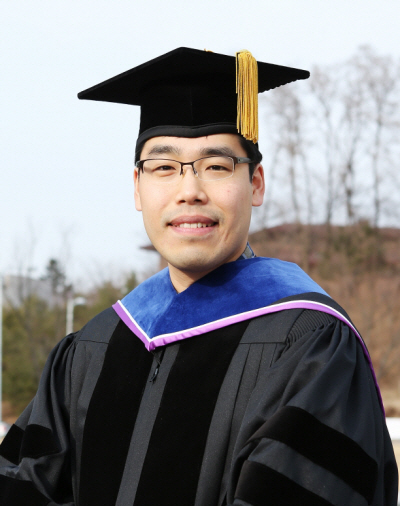 A game enthusiast received a Ph.D. at the 2014 commencement
A high school student, who was addicted to video gaming and had barely managed to gain entrance to KAIST, became a star of its 2014 commencement ceremony.
The student was Tae-Woo Park who received his Ph.D. in games at 32 years of age.
Park entered KAIST in 2002 as an undergraduate student. However, owning to bad grades, he was not accepted to the graduate school of KAIST until 2006. He began playing games at the age of 7, which distracted him from his studies at an early age. Nevertheless, he was able to complete master’s degree after two and a half years, which normally takes two years for average students.
Professor Joon-Hwa Song saw a possibility from his student’s experience of producing and commercializing a mobile puzzle game while Park was working as a president of the game club, HAJE, at KAIST. Professor Song advised him to take the advantage of his interests and try developing game platforms and contents. Park decided to develop a game that could help others and would change people’s negative views of games. He created a whole new generation of games.
In order to find ideas for games that can be easily enjoyed in daily lives, Park went to numerous gyms, swimming pools, daycare centers, and parks to analyze people’s behaviors and discussed with his colleagues who were also interested in games. During this process, the experience of organizing creative ideas through cooperation and discussions became a great foundation for his future research.
He observed some people quitting midway during a workout on treadmills because they were bored with working out alone. From this, Park embarked on developing a new style of game that allowed people to exercise together.
Park used the system on a treadmill, which recognizes the speed of the person running to automatically adjust the machine’s speed, to develop an interactive game platform for Swan Boat. The Swan Boat game is a race exercise game that adjusts the direction according to speed difference between two players. The game utilizes the difference of running speed between two people on treadmills to change the direction of the boat.
With the Swan Boat game, people can now play games and exercise at the same time. The technology also allows online access anywhere in the world, which means checking friends’ rankings at nearby gyms or homes, or even a World Gym Running Contest.
In addition, Park helped develop various next generation exercise games and life-based services, including the sparrow chirp application, which finds children that go astray, or an avatar game that utilizes the user’s daily life patterns. These results and papers attracted attention from international societies and have also won a number of awards.
Professor Song said, “There has been no precedent of receiving a Ph.D. at KAIST for developing games, however, Park’s case has given courage to many people that if you can create what is really required in everyday life, you can indeed receive a doctor’s degree.”
Park remarked, “I’d like to express my gratitude to my advisor, Professor Song, for giving me courage. I want to continue to make games that can help people’s lives in the future.”
Park will continue his work at the NASA Ames Research Center this June.
2014.02.27 View 10745
A game enthusiast received a Ph.D. at the 2014 commencement
A high school student, who was addicted to video gaming and had barely managed to gain entrance to KAIST, became a star of its 2014 commencement ceremony.
The student was Tae-Woo Park who received his Ph.D. in games at 32 years of age.
Park entered KAIST in 2002 as an undergraduate student. However, owning to bad grades, he was not accepted to the graduate school of KAIST until 2006. He began playing games at the age of 7, which distracted him from his studies at an early age. Nevertheless, he was able to complete master’s degree after two and a half years, which normally takes two years for average students.
Professor Joon-Hwa Song saw a possibility from his student’s experience of producing and commercializing a mobile puzzle game while Park was working as a president of the game club, HAJE, at KAIST. Professor Song advised him to take the advantage of his interests and try developing game platforms and contents. Park decided to develop a game that could help others and would change people’s negative views of games. He created a whole new generation of games.
In order to find ideas for games that can be easily enjoyed in daily lives, Park went to numerous gyms, swimming pools, daycare centers, and parks to analyze people’s behaviors and discussed with his colleagues who were also interested in games. During this process, the experience of organizing creative ideas through cooperation and discussions became a great foundation for his future research.
He observed some people quitting midway during a workout on treadmills because they were bored with working out alone. From this, Park embarked on developing a new style of game that allowed people to exercise together.
Park used the system on a treadmill, which recognizes the speed of the person running to automatically adjust the machine’s speed, to develop an interactive game platform for Swan Boat. The Swan Boat game is a race exercise game that adjusts the direction according to speed difference between two players. The game utilizes the difference of running speed between two people on treadmills to change the direction of the boat.
With the Swan Boat game, people can now play games and exercise at the same time. The technology also allows online access anywhere in the world, which means checking friends’ rankings at nearby gyms or homes, or even a World Gym Running Contest.
In addition, Park helped develop various next generation exercise games and life-based services, including the sparrow chirp application, which finds children that go astray, or an avatar game that utilizes the user’s daily life patterns. These results and papers attracted attention from international societies and have also won a number of awards.
Professor Song said, “There has been no precedent of receiving a Ph.D. at KAIST for developing games, however, Park’s case has given courage to many people that if you can create what is really required in everyday life, you can indeed receive a doctor’s degree.”
Park remarked, “I’d like to express my gratitude to my advisor, Professor Song, for giving me courage. I want to continue to make games that can help people’s lives in the future.”
Park will continue his work at the NASA Ames Research Center this June.
2014.02.27 View 10745 -
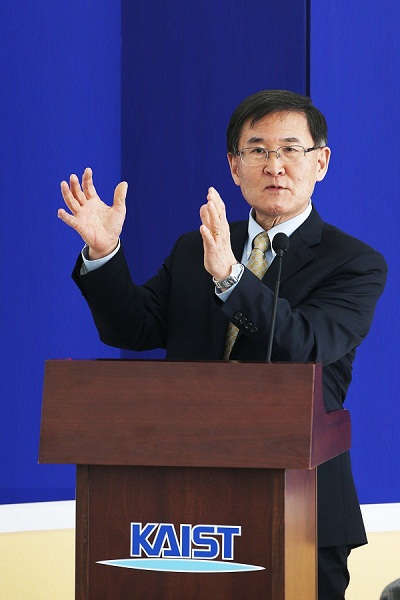 KAIST President Held One-year Anniversary Press Conference
President Steve Kang had a press conference
on February 25, 2014 at the Faculty Club on campus, commemorating the first
year of his presidency. About 30 different media representatives nationwide
attended the meeting.
At his first press conference on the anniversary of his tenure, President Kang
described what he has achieved in the past year, which were: 1) rebuilding the
campus culture to start a campaign for mutual respect, trust, and open
communication by holding meetings with the members of the KAIST community more
than 60 times, 2) establishing core values, creativity and challenge, to
enhance the fabric of the community, 3) restructuring of the university
administration, and 4) the announcement of the mid- and long-term development
plan.
He also mentioned that “2014 will be another exciting year for KAIST to make
more progress” and laid out a few major projects to be implemented this year:
launching of the “Committee for Engineering Education Innovation,” “Startup
KAIST” (an entrepreneurship program), “Greater Collaboration in Technology
Translation and Management with Seoul National University,” and “KAIST End Run”
(a global business incubation program).Explanation of 2014 Major Endeavors by President KangFor
the past decade, domestic engineering schools weighed SCI dissertation
publication more heavily in university evaluations, yielding a world-class
research level. However, such an approach resulted in placing less importance
on entrepreneurship, commercialization, or creating economic values.As a
result, engineering Professors have been evaluated as being too focused on theoretical
SCI dissertation research rather than practical research that could yield
economic benefits through commercialization of developed technology. In
addition, some have criticized that engineering universities have not educated
creative researchers demanded by the industry.KAIST
has begun responding to these criticisms and has made a few suggestions to strengthen
engineering education, promote entrepreneurship in engineers, and globalize Korean
venture companies.As
part of such efforts, KAIST established the KAIST Education and Research
Innovation Committee, composed of various individuals from the industry,
research institutes, alumni, faculty members, and others, to discuss ways to reinforce
engineering education.
A
course to encourage entrepreneurship will be implemented.Startup
KAIST will develop and commercialize innovative ideas from members of KAIST, and
the End Run project will enable students and faculty to establish a global,
venture company. KAIST hopes that a new entrepreneurial culture will be created
on campus, thereby the research success of KAIST members will lead to commercialization
and startups.KAIST
plans on releasing free internet lectures as part of its knowledge contribution
and sponsoring programs which will level the playing field in eduation.KAIST
will establish the KAIST Open Online Course (KOOC). An entrepreneurship
curriculum will be developed for KOOC. KAIST will start trials for KOOC from
2015, gradually expanding to include more courses.
2014.02.27 View 9499
KAIST President Held One-year Anniversary Press Conference
President Steve Kang had a press conference
on February 25, 2014 at the Faculty Club on campus, commemorating the first
year of his presidency. About 30 different media representatives nationwide
attended the meeting.
At his first press conference on the anniversary of his tenure, President Kang
described what he has achieved in the past year, which were: 1) rebuilding the
campus culture to start a campaign for mutual respect, trust, and open
communication by holding meetings with the members of the KAIST community more
than 60 times, 2) establishing core values, creativity and challenge, to
enhance the fabric of the community, 3) restructuring of the university
administration, and 4) the announcement of the mid- and long-term development
plan.
He also mentioned that “2014 will be another exciting year for KAIST to make
more progress” and laid out a few major projects to be implemented this year:
launching of the “Committee for Engineering Education Innovation,” “Startup
KAIST” (an entrepreneurship program), “Greater Collaboration in Technology
Translation and Management with Seoul National University,” and “KAIST End Run”
(a global business incubation program).Explanation of 2014 Major Endeavors by President KangFor
the past decade, domestic engineering schools weighed SCI dissertation
publication more heavily in university evaluations, yielding a world-class
research level. However, such an approach resulted in placing less importance
on entrepreneurship, commercialization, or creating economic values.As a
result, engineering Professors have been evaluated as being too focused on theoretical
SCI dissertation research rather than practical research that could yield
economic benefits through commercialization of developed technology. In
addition, some have criticized that engineering universities have not educated
creative researchers demanded by the industry.KAIST
has begun responding to these criticisms and has made a few suggestions to strengthen
engineering education, promote entrepreneurship in engineers, and globalize Korean
venture companies.As
part of such efforts, KAIST established the KAIST Education and Research
Innovation Committee, composed of various individuals from the industry,
research institutes, alumni, faculty members, and others, to discuss ways to reinforce
engineering education.
A
course to encourage entrepreneurship will be implemented.Startup
KAIST will develop and commercialize innovative ideas from members of KAIST, and
the End Run project will enable students and faculty to establish a global,
venture company. KAIST hopes that a new entrepreneurial culture will be created
on campus, thereby the research success of KAIST members will lead to commercialization
and startups.KAIST
plans on releasing free internet lectures as part of its knowledge contribution
and sponsoring programs which will level the playing field in eduation.KAIST
will establish the KAIST Open Online Course (KOOC). An entrepreneurship
curriculum will be developed for KOOC. KAIST will start trials for KOOC from
2015, gradually expanding to include more courses.
2014.02.27 View 9499